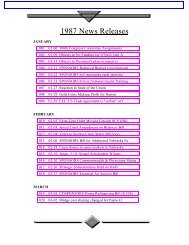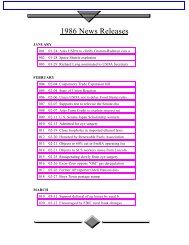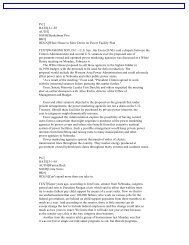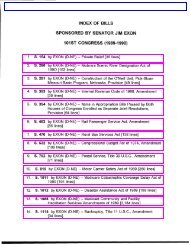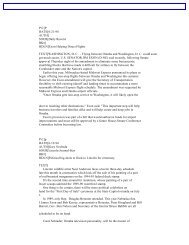1986 - The Exon Library
1986 - The Exon Library
1986 - The Exon Library
You also want an ePaper? Increase the reach of your titles
YUMPU automatically turns print PDFs into web optimized ePapers that Google loves.
condemnation of yesterday's crimes. Only by integrating<br />
this amendment into the Treaty itself will the U.S. make it<br />
clear that it does not consent to any form of genocide. As<br />
British author Oliver Goldsmith said, "silence gives<br />
consent," and ratification of the treaty as it now stands<br />
would equal acquiescence in the crimes of nations which are<br />
committing political genocide. <strong>The</strong> U.S. is presently at a<br />
moral disadvantage, they asserted, because it has not<br />
formalized its opposition to genocide. While it is "utter<br />
nonsense" to argue that the U.S. must ratify this Treaty<br />
before it can justifiably criticize the USSR, Cambodia, and<br />
other nations for the "barbarity of their genocidal<br />
actions," this amendment would put these nations on the<br />
defensive because it would force them to adopt or reject<br />
the amended version, thereby showing their "true colors."<br />
Those who argue that we should ratify this flawed document<br />
and then seek its modification must realize that this<br />
amendment would never get through the U.N. without being<br />
vetoed by the Soviets or its allies. Furthermore, the<br />
Senate should not irresponsibly ratify any unacceptable<br />
document with the hope that it will be made acceptable<br />
afterwards.<br />
Opponents claimed that adoption of this amendment would be<br />
tantamount to rejection of the Treaty because of the<br />
parliamentary problems which it would pose. <strong>The</strong> 96 other<br />
signatories would have to consent to any amendment of the<br />
Convention before the President could ratify it on behalf<br />
of the U.S. Although the Genocide Treaty does not address<br />
the problems of political genocide, it expresses many other<br />
important sentiments which the U.S. needs to reaffirm<br />
through ratification. U.S. interests would be adequately<br />
safeguarded by the Treaty and its reservations, and our<br />
ratification would prevent the Soviets and other<br />
practitioners of political genocide from using America's<br />
failure to ratify this document to divert world attention<br />
from their conducting such crimes. Many voiced their<br />
support for the substance of the amendment and stated their<br />
intent to vote for it if offered as free-standing<br />
legislation.



